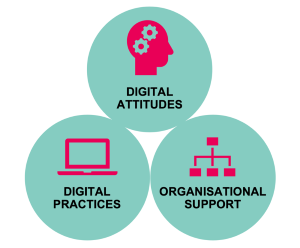 The National Lottery Heritage Fund (NLHF) have launched their Digital Attitudes and Skills for Heritage (DASH) free survey service for UK heritage organisations to help ‘capture [and use] a summary of key digital skills and attitudes of their staff and volunteers’.
The National Lottery Heritage Fund (NLHF) have launched their Digital Attitudes and Skills for Heritage (DASH) free survey service for UK heritage organisations to help ‘capture [and use] a summary of key digital skills and attitudes of their staff and volunteers’.
Timmus writes:
What is the DASH Survey?
The Digital Attitudes and Skills for Heritage (DASH) survey launched on 27th April 2020. It’s a free resource – funded by the National Lottery Heritage Fund – that allows UK heritage organisations to capture a summary of key digital skills and attitudes of their staff and volunteers, and use this to support reflection and identify improvement opportunities for working better together. More than 100 organisations have already signed up.
Why should organisations join in?
The DASH survey allows heritage organisations to:
• Discover more about the digital attitudes and aptitudes of their staff and volunteers
• Find out what their staff and volunteers think about the digital support they receive
• Reflect on what they and their people do well when it comes to digital technologies, and where there are opportunities for improvement
“This situation has forced us to use digital more, and we won’t be going back … We will be embedding digital into our processes in future so collecting data now using this survey is really useful … I think the Heritage Fund is being forward thinking, supportive and this will add considerable value for beneficiaries and organisations for the future” [said] Amelia Morgan, CEO, Venture Trust
How the DASH survey works
The DASH survey (designed and managed by Timmus Ltd, with the generous support of an advisory board of industry experts) collects information across an organisation’s staff and volunteers which helps them to better understand and support their people now and in the future.
The seven steps of the DASH Survey process. These are described in detail below.
Step 1. One person from each organisation working across heritage – ideally the digital lead – signs up on behalf of their organisation via these links:
The sign-up page also enables organisations to describe their digital support needs over the next two months. Organisations that have the ability to volunteer to share their own digital expertise and practice can also let us know via the form. This information will be triaged across the Digital Skills for Heritage projects.
Step 2. The lead contact is sent a web link, via email, from the DASH support team. It takes up to one week from submitting your sign-up form to receiving your email. The web link is only for people in their organisation to use (do not share with others outside of your organisation). This link allows an organisation to collect data only from their people.
Step 3. The lead contact shares the web link to their copy of the survey – ideally by email or text – to their organisation’s staff and volunteers, ensuring that everyone knows DASH is:
- Voluntary to complete
- Completely anonymous (it asks for age category, gender and broad job role area, but no personal details)
- Can be completed easily on a smart phone, tablet or computer
We recommend sending it to as many people as possible in order to collect data that represents a broad and balanced view of digital skills and attitudes.
Step 4. Staff and volunteers in an organisation complete the DASH survey. Surveys will close on 10th July.
Step 5. Once an organisation has collected 10+ responses the lead contact will also be given access to a live data dashboard which allows them to view their organisation’s summary data as it comes in. This will not include answers to free text questions; these are shared at the end of the project. It will take us up to one week to email the dashboard link to the lead contact.
Step 6. Once surveys close, the lead contact of each organisation will be emailed a file containing all of the data collected from their people. It will take up to two weeks for the DASH team to send these emails.
Organisations can use their data for strategic planning, tracking annual trends, and benchmarking with the national dataset.
Step 7. We will analyse all data collected and use the information provided to summarise digital attitudes and skills across the heritage sector, identify gaps, and highlight great practice. We will share a sector wide report on the findings in October.

